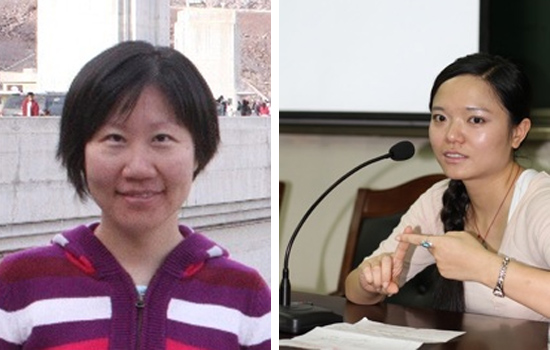Professors honored by National Science Foundation
Grants enable research into software analysis and non-invasive personalized healthcare
Wei Le, left, and Linwei Wang each received the Faculty Early Career Development (CAREER) Program award from the National Science Foundation.
Two assistant professors in Rochester Institute of Technology’s computing and information sciences Ph.D. program have received the Faculty Early Career Development (CAREER) Program award from the National Science Foundation.
Wei Le was awarded $446,692 for a project that addresses quality assurance problems related to software. Linwei Wang was awarded $446,143 for a project that improves non-invasive and personalized medicine by integrating computer simulations into data-driven learning.
The CAREER Program is an NSF-wide activity that supports junior faculty who exemplify the role of teacher-scholars through outstanding research, excellent education and the integration of education and research within the context of the mission of their organizations. Such activities, the foundation states, build a firm foundation for a lifetime of leadership in integrating education and research.
Beginning this summer, Le will use the NSF award for her project titled, “Analyzing Program Changes and Versions for Bug Detection and Diagnosis.” Over the next five years, she will develop program analysis to address quality assurance problems related to program changes and different versions. The research specifically addresses three challenges—verifying changes for efficient and reliable software releases, automatically diagnosing failures in changes and effectively patching multiple versions of software.
Le describes software development as inherently incremental.
“In recent studies, researchers found that when programming a change the most important information a developer wants to know is whether the change breaks any code elsewhere,” said Le. “The research will result in tools and techniques transferable to industry for detecting bugs in software changes, explaining software failures and generating patches.”
Le also works with the Better Software @RIT research group to develop fundamentals and applications of program analysis and software testing. The group seeks automatic, practical solutions in the areas of software engineering, systems and programming languages for improving software reliability, security and productivity.
Prior to coming to RIT, Le received her Ph.D. and master’s degrees in computer science from University of Virginia. She also received her Bachelor of Science degree in computer science from Zhejiang University in China.
Wang will use the NSF award over the next five years for her project titled, “Integrating Physical Models into Data-Driven Inference.” The project, which begins this summer, will develop theoretical, algorithmic and computational infrastructure to support the integration of complex domain knowledge, specifically physics-based computer models, into learning methods that estimate hidden variables from observational data
While applicable to many scientific domains, Wang plans to apply these methods to computational physiology and biomedicine, specifically in the field of cardiovascular imaging and cardiac electrophysiology.
“Catheter ablation, the current minimally invasive surgery for cardiac arrhythmia, has many limitations for creating a continuous map of the heart,” said Wang. “The computational system developed in this project will be able to non-invasively image the 3D electrical activity of an individual’s heart, which will improve personalized treatment for many heart diseases, such as ventricular arrhythmia and heart failure.”
Wang is director of the Computational Biomedicine Laboratory, which focuses on computational systems biomedicine that adapts systems approach and concept to medical problems, specifically the electrophysiology and electromechanics of the heart.
Wang received a Ph.D. in computing and information sciences in 2009 from RIT’s B. Thomas Golisano College of Computing and Information Sciences. Prior to coming to RIT, Le received her Master of Philosophy in electronic and computer engineering from Hong Kong University of Sciences and Technology, and her Bachelor of Science degree in optic-electronic information engineering from Zhejiang University in China.








